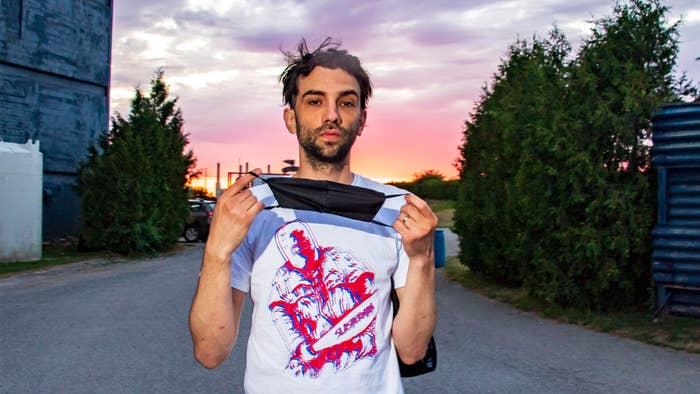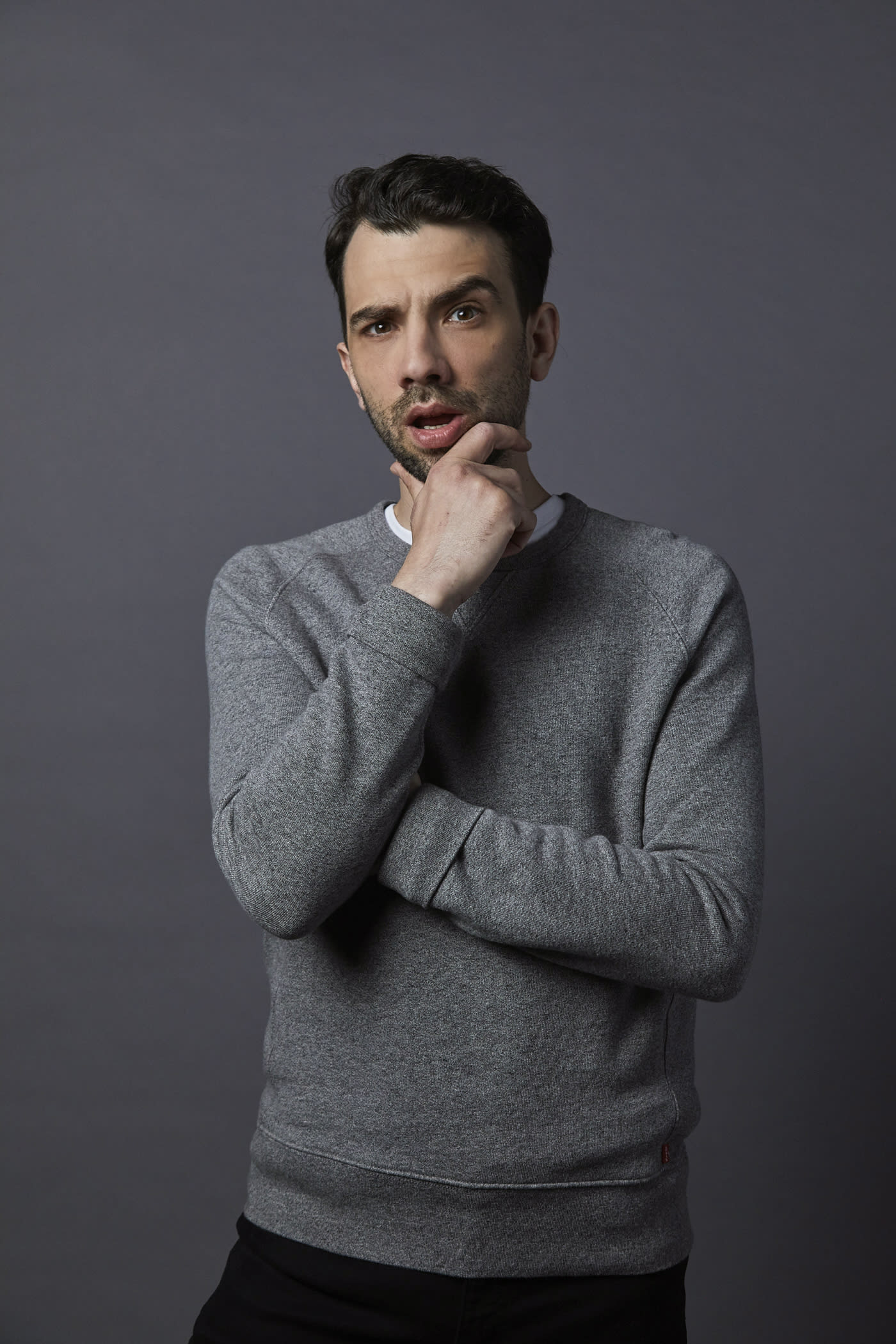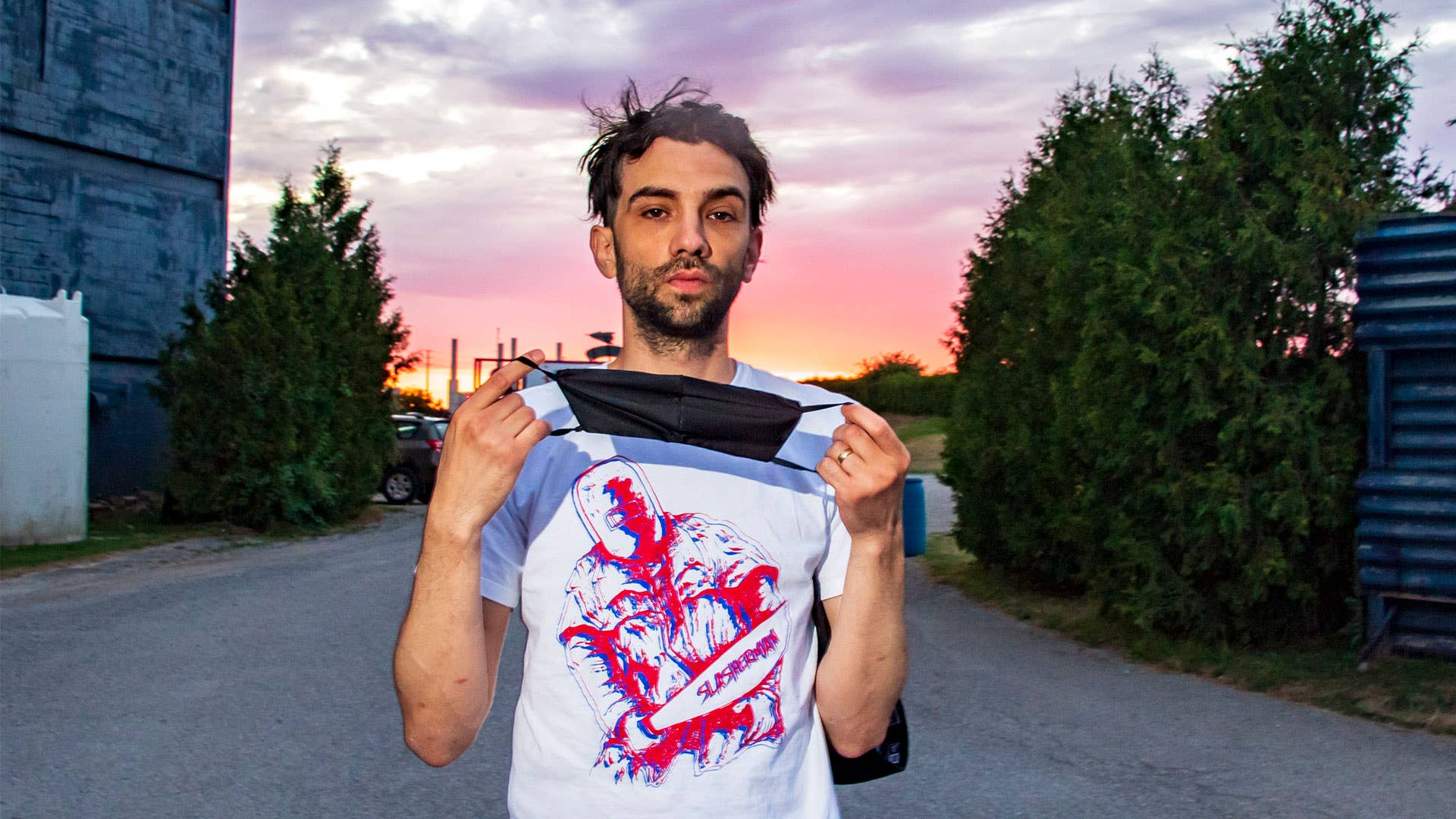
You already know Jay Baruchel likes weed. That’s because you’ve watched him over the years in stoner comedies like Knocked Up and This Is the End, mastering the art of the bong rip alongside fellow Canadian funnyman (and pothead) Seth Rogen.
What you may not know, however, is that it was Rogen who first got Baruchel baked.
“We were both 18 in California and [Rogen] refused to accept that I wouldn’t like weed,” the 39-year-old actor-director recalls. “I was telling him I was terribly underwhelmed by it, and he was like, ‘It’s really made for you, man. Your stomach’s always bugging you and you like thinking about big, deep, wanky existential stuff.’”
Eventually, Baruchel let up. “I was like, ‘OK fine, I’ll try it once.’ It was like something out of a movie: he put on Dark Side of the Moon and wouldn’t ya know it, here I am 20 years later hosting a podcast about weed [laughs].”
The podcast he’s referring to is Highly Legal, a new Canadian Audible Original series that launched this week and sees him plunge into the legalization of cannabis in the Great White North. He talks to industry players about things like the continued resilience of the black market, the ongoing debate over cannabis in the medical community, and Canada’s laughably tight weed marketing restrictions. Evidently, ever since that first toke, marijuana is something Baruchel’s thought about a lot.
Of course, since Canada became the first G7 nation to legalize recreational cannabis in 2018, there’s been much to think about. Highly Legal—which debuted as part of Audible’s new Plus Catalogue, offering members access to 12,000 titles at no extra cost—muses on every aspect of it, leaving no stone® unturned. Most interestingly, it examines the hypocrisy of weed legalization, where Canadians with prohibition-era pot convictions continue to face repercussions for their criminal records, while the cops who used to hound them are now cashing in on the burgeoning industry.
“We’re not just talking about being able to buy weed in the store. Now we’re talking about what this means for class warfare, health care, and education. It’s just important shit that’s worth knowing,” says Baruchel.
We caught up with Jay to talk about said important shit, like how legalization’s going in Canada, what to do about the Man scummily profiting off the green rush, and why he finally embraced cannabis after spending most his teens fearing it (for some very understandable reasons).
It’s a fairly well-established fact that you are a stoner. What role would you say weed plays in your life?
Generally, it’s kinda had a legacy of being a clarifying agent in my life. I, as a worrywart, used to have a tendency to worry about everything, stuff over which I exert zero control. And one of the good effects pot has had on my life is it’s made me realize that things like being a good husband and son and brother and friend, making sure the bills are paid on time, doing good work—so long as that stuff is all accomplished, then everything else can kinda wait.
So, in other words, it’s made you the exact opposite of what all the myths about weed say it makes you: lazy, irresponsible, a terrible person.
Certainly for me, you know? I don’t think it makes anybody anything that they aren’t already. I hate attributing somebody’s poor decision-making to something else other than them. And look, I am no shining example of anything. All I’m saying is that motivation, or lack of motivation, certainly for me, has nothing to do with marijuana and everything to do with what the rest of my fucking life looks like, which is probably the case for most people.
“I never thought I’d say this, but there’s too many pot stores in Toronto.”
On your podcast you like to ask people for their cannabis origin stories. I’m wondering what yours is: Do you remember the first time you smoked weed and what it was like?
Yeah. Well, there’s the fake one and the real one. The fake one being when, like, I thought I was smoking weed but then somebody was like, “You’re not inhaling it right.” I was super proud that it was having no effect on me [laughs]. But the real one, I guess I don’t tell many people this one, but yeah… A friend of mine who is quite famous named Seth Rogen, we were both 18 in California and he refused to accept that I wouldn’t like weed. I was telling him I was terribly underwhelmed by it, and he was like, “It’s really made for you, man. Your stomach’s always bugging you and you like thinking about big, deep, wanky existential stuff. And you like crazy music and shit.” So he goes, “Here, promise me you’ll try it once with me in a controlled, specific spot where it’s just you and me and nobody can bug us and you won’t have to worry about anything. If you don’t like it after that, I will never bring it up ever again.” And I was like, “Ok fine, I’ll try it once.”
It was like something out of a movie: he put on Dark Side of the Moon and wouldn’t ya know it, here I am 20 years later hosting a podcast about weed [laughs]. So yeah, the rest is history, man. I think the sentence I kept saying was, “Oh, it’s like candy! It’s like candy!” That’s what I kept saying: It tastes like candy.
Amazing.
Yeah, for me it was a big one because I’m half-Jewish, which means the likelihood of m having stomach problems skyrockets the day that I’m born. So, I have a garbage stomach. And my whole fucking life I’ve been nauseous. When I was a kid I was perpetually queasy. And I get that paired with what I inherited from my mother, which is a crippling—thankfully crippling—allergy to alcohol. My liver lacks the proper enzymes, so I barf every fucking time. And then I discovered weed, which not only didn’t make me puke, but made me hungry—which also was a game changer for me because there’s such a thing as like, you can be skinny and have a fucking weird eating thing, man! Like me. Keeping the weight up and having an appetite was quite a monkey on my back for a while. And all of a sudden, I was hungry, I was chill, I worried a lot less. I was like, “Oh, this was literally invented for me!”
So you really weren’t sold on it at first, but Seth brought you over to the green side.
Yeah, well, he saw that I was the right guy for it. And like, you know, it certainly isn’t for everybody. But it is for some people! And it sure as fuck is for me, man.
[Laughs] Absolutely. Tell me, this podcast, it’s interesting in that it’s about the very, very recent history of cannabis legalization in Canada. Like, this is all so new. So why do you think it’s important to tell this story that’s still kind of unfolding?
Because there’s already so much that’s worth knowing. You know, this has ramifications that are not limited to one facet of Canada. This has an effect on health care, on education, obviously on the corporate world. And this is just one of those profound shifts that’s happening quite quickly. Like, wouldn’t it be cool to have been at Ground Zero during the Gold Rush at Dawson City, and to have been able to analyze it as it was happening, as opposed to just relying on a handful of extant black and white photos, a few anecdotes, and Jack London’s racist diary? We get the chance to unpack this in real time! And I would posit that one of the things we do well in this country is self-doubt and self-analysis. So it’s an incredibly Canadian reaction to legalize this and within less than half a decade, to be analyzing it from a holistic ecosystem perspective.

Yeah, totally. It’s a unique time in history. It’s fascinating shit! So, having done a pretty thorough deep dive into all this stuff, what can you say about how legalization has been going in Canada? What’s your opinion?
I think it’s been going very, very well, especially considering it is different from province to province. And I understand why Ottawa is forever passing the buck in the name of plausible deniability, like, “This is not our fucking problem!” [Laughs] So I get that. But at the same time, obviously, what that does is it affords us some great ways to compare and contrast and see that some places are maybe running a bit smoother than others, you know? [I like how] we didn’t really go incrementally like we did with health care, where it was one victory after another and more and more sort of compensation. It wasn’t overnight like this was. So, I think all that being said, it’s going remarkably well.
Certainly for me, as somebody that in every other aspect of my life, was punctual and law-abiding and taxpaying, except for this one, where I was forced to constantly be a criminal and consort with certain folks and know that no matter what, at best, my money was going to the Hells Angels at the tiptop of the pyramid… I would always be like, “Please, let me pay twice as much, tax the fuck out of me, just let me buy it in a store at two o’clock in the afternoon with the receipt because I’m not ashamed of it.” And I shouldn’t be. And I’d rather my money go to the rest of my country than fucking organized crime.
“If we all believe a thing is so legal that we can now make money off it, then we have to say retroactively that anybody who’s in prison because of it has to be f*cking free. But yeah, man, white supremacy is gonna white supremacy.”
Well, this is interesting because there’s a really crazy stat in your podcast—you reference a study that says of the total cannabis sales in Canada last year, only 30 percent came from legal sources and the rest was the black market. That’s fucking nuts!
It’s crazy, but it’s to be expected. I bet you any money that the first few years post-prohibition in the States and Canada, it was the same thing. I bet people still went to their hookups and got the moonshine that they liked and developed a taste for, right? And here’s the other thing: You can’t fault them for wanting fresher weed. I, as a point, buy legally. I wanted to for years and years, I have the chance, that’s what I do. And I want to support the businesses I think are worth supporting. However, I don’t fault anybodyfor going to their guy and using those numbers that still exist because his shit is not going to be dry and is probably going to be more potent. So I understand why it’s happening, but I think that’s just a growing pains thing that will ultimately level out over time.
Yeah. Well, you’ve got that episode about the illegal dispensaries that still exist, like CAFE. I mean, a lot of my friends still go to CAFE for the reason you mentioned: it’s just better quality bud.
Yup, yup. And everybody else tells me CAFE’s stuff gets you fucking ripped, so I get why people go [laughs]…. I never thought I’d say this, but there’s too many pot stores in Toronto [laughs]. Like, I don’t need like four in the neighbourhood; I’m fine with one or two. But whatever, do what you gotta do, take that risk, man. That’s on you. I would just hope that at a certain point it maybe matches the underground in quality, which I think it inevitably will. That’ll be the coolest.
Do you think a lot of the resistance to buying legally also stems from skepticism of the system? And people just seeing the hypocrisy of it? Like, all these formerly tough-on-crime police and politicians are now getting in on the legal market and making bank.
Aw man, yeah, and that boils the blood. I understand why you wouldn’t want to give your money to somebody that made a career sending people to prison for smoking pot. Like, there’s an inherent unfairness to creatures from the corridors of power in Ottawa and Toronto, who have all these shorthand relationships, using that to keep small businesses down. So I get why you wouldn’t want to fund the Man. I just wouldn’t want to fund mobsters either. But by the way, that is me. People can decide who the villains are in their life and that’s that. But for me, even if I’m funding the Man, at least I know that some of it eventually goes to doctors and nurses and textbooks and roads and stuff I actually give a shit about. I feel like if I send it into the void, I don’t know how much of that is manifested in social programs.
True, true. But there’s also the other stat, where there’s a disproportionate amount of Black and coloured Canadians who have criminal records from weed arrests, which are still fucking their lives up to this day. And it’s extra skeezy because not only are cops now getting in on the legal industry, but it’s also mostly white dudes who are profiting off of it. What do you make of that?
It’s transparent and ugly and legalization means nothing without full-blown amnesty and pardons and expungement. Clear the fucking record, man. Like, if we all believe a thing is so legal that we can now make money off it, then we have to say retroactively that anybody who’s in prison because of it has to be fucking free. They never should have gone to prison in the first place! But yeah, man, white supremacy is gonna white supremacy. The system is what it is. And it is painfully obvious to anybody who sees, who’s looking at what these CEOS look like. And so, there’s an inherent unfairness. But I think it’s hopefully the same as anything, which is, there’s a bunch we need to fix in this country and I don’t know that it’s as simple as like, yeah, it’s clearly lily-white as fuck. So what do we change in the entire country, the entire makeup of our DNA, so that that is no longer the case? That is the goal. That is where we should be heading. But you know, obviously we’ve got a million miles to go on that shit in this country. At least it’s being discussed.
Yeah, at least we’re putting it out there. You know, I grew up watching you in all those stoner comedies with your boy Seth Rogen, who you mentioned earlier. You guys were playing lovable potheads and smoking a bunch of weed—pretty much playing yourselves—in these mainstream movies. Do you feel like you sort of played a role in the normalization of pot usage?
Yeah, I definitely think we didn’t hurt. And, you know, money talks. That’s the fucking sad truth of the way the Western world works. When I was like 22, I did an interview in a magazine and one of the questions was, “What’s the thing that’s always in your bag?” And so I said, “Rolling papers.” And my manager got on the fucking phone and gave me a talking to. He was like, “Careful! Listen, I’m cool, I don’t mind, but I don’t want other people to alienate and judge you.” But then Knocked Up comes out and it’s a fucking box-office darling pretty much from the word go. And I remember the same manager was then telling me about some script he was sent and he was like, “It’s about a couple of stoners hanging out, and I just thought, you know, this is the kind of thing you should...” And I cut him off. I was like, “You know, less than fucking five years ago you gave me shit for mentioning rolling papers because it would be bad for my career. So what’s changed? Oh, that it’s bankable in a commercial mainstream sort of sense? That there’s real money to be made?” No fucking shit, man! The drug dealers do that already! So I definitely think that—at the cost of being dismissed as useless stoner-slacker fucks—we just made it a thing because it was perfectly normal to us, man.
And I’ll go one further: I had a dad that died of a drug overdose. I don’t do anything else! And I never have. I don’t fuck with party drugs. That shit’s not for me, because, like, when you grow up in the Act III of a coke-addict movie, when it’s all nosebleeds and paranoia—when you skip Act I of the romance and the montage and the dance music, and you wake up in the middle of fucking Act III where Ray Liotta’s worried about fucking helicopters…. When you’re the kid there? You will never do that shit! And so, I got pissed off, super pissed off that I would be instantly written off and then people would think…. I was like, no! All I am is a fucking kid that smokes weed, man! And I bet you any money if more people smoked weed, there’d be a lot less people beating the fuck out of each other in the streets.
Word, man! Absolutely. Damn.So, I guess having that tragic experience early in your life really only made you steer clear of hard drugs or anything like that….
Absolutely. It’s the only way that I could have gone out to L.A. at 18 alone and to come out of it unscathed, man. And to have come of age in Montreal of all fucking cities! I grew up in a party town and then went to fucking L.A. at 18! In my entire twenties I was just going back and forth between those two fucking places, man. Like, trust me, there was an opportunity to get caught up and to get distracted. But that was never an option. There was no appeal to it. I had too many cautionary tales. And so I would get annoyed when people would try to throw Mary Jane in the same bin as that shit, because it’s not and doesn’t deserve to be treated that way.
Right on, man. It’s not even close to being the same. So, early on, did your initial hesitancy to weed maybe stem from the fact that you associated it with other drugs?
Yeah, because my dad did everything. He did absolutely everything. And that was one of the things he did, right? And so, I went straight edge as a reaction. But then I realized that, like, you know, I needn’t always throw the baby out with the bathwater.
Yeah. And I mean, it’s just such a great alternative to all that other shit.
I think so. And also, more to the point, if you can do the thing and it’s not making you sick and you’re a great person and you’re not hurting anybody…. Like, all of the metrics that led to us eventually legalizing it [laughs] and realizing that it is something that can be out there, I got there myself. I just got there before Ottawa did.
Lastly, I must ask: How much weed did you smoke after the Habs got eliminated in the Finals?
[Laughs] Oh, man. I don’t know if it was more when we got in or more when we got knocked out. Yeah, significant, significant amounts. The best was being in Montreal for Game 4 at the Bell Centre for that shit and stepping out into the middle of that. Like, you know, there’s a thing people misunderstand about my city: there’s a lot that’s broken about it, but we’re not pussies, man. So when we lose, you can hear a pin drop in my city. You hear a fucking pin drop. I knew it. I knew that if we get knocked out, it’s going to be quiet as fuck. But when we win? That’s when, you know… so the riot cops are now on the loose [laughs]. And so, it was a frenzy. And I was trying to explain to my wife, who’s a girl from Port Dover, Ontario. I wanted to show her, like, I’m not praising or encouraging people to riot. I’m just saying it’s a specific energy to be at the Bell Centre when we win, to walk out into a hot summer night, everyone’s just going fucking bananas to the point that the cops have to literally start throwing tear gas at us and shit. It was time to go back to the hotel, you know, but it was cool. So I definitely burned a few that night [laughs].


